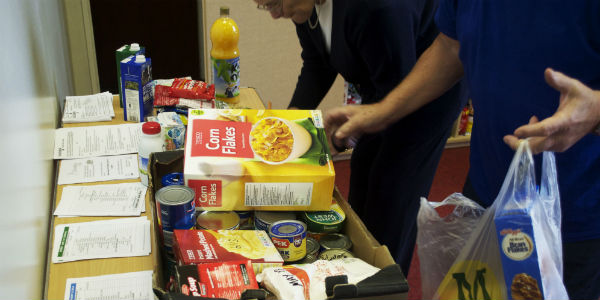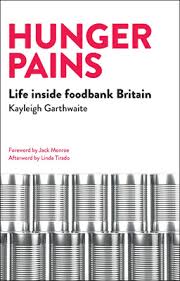Book review: Hunger Pains – Life Inside Foodbank Britain
In Hunger Pains: Life Inside Foodbank Britain, Kayleigh Garthwaite draws upon eighteen months spent volunteering as a foodbank worker in Stockton-on-Tees to take readers through the workings of a foodbank and to reflect on the experiences of those who use them, including discussion of shame and stigma. This is a revealing, impassioned and self-reflective book on the taboo subject of food poverty in a rich country, drawing timely and vital attention to the injustice of food hunger in Britain today, writes Heather Mew.

Packing at a foodbank in Newcastle-under-Lyme, Staffordshire, in 2012. Photo: Staffs Live via a CC-BY-NC 2.0 licence
Hunger Pains: Life Inside Foodbank Britain. Kayleigh Garthwaite. Policy Press. 2016.
 By volunteering as a foodbank worker for eighteen months, Kayleigh Garthwaite’s Hunger Pains: Life Inside Foodbank Britaintakes the reader on a step-by-step journey through the workings of a foodbank from why red vouchers for food parcels are issued to the shame and stigma placed upon service users by the media and public perceptions. Garthwaite’s research is based at Hebron Church Foodbank in Stockton-on-Tees, an ex-industrial town with high levels of unemployment and health inequalities so stark that the town is the subject of a large-scale, interdisciplinary Durham University study, Local Health Inequalities in the Age of Austerity. Hunger Pains discusses the rise in foodbank use and food poverty across the country, and highlights some of the experiences of foodbank users in Stockton-on-Tees.
By volunteering as a foodbank worker for eighteen months, Kayleigh Garthwaite’s Hunger Pains: Life Inside Foodbank Britaintakes the reader on a step-by-step journey through the workings of a foodbank from why red vouchers for food parcels are issued to the shame and stigma placed upon service users by the media and public perceptions. Garthwaite’s research is based at Hebron Church Foodbank in Stockton-on-Tees, an ex-industrial town with high levels of unemployment and health inequalities so stark that the town is the subject of a large-scale, interdisciplinary Durham University study, Local Health Inequalities in the Age of Austerity. Hunger Pains discusses the rise in foodbank use and food poverty across the country, and highlights some of the experiences of foodbank users in Stockton-on-Tees.
One striking feature of Garthwaite’s Hunger Pains is the way in which she centres the voices of people who use and experience the foodbank throughout the book. This is done through interview extracts, fieldwork diary excerpts and storytelling; at its essence, Hunger Pains is a collection of stories about the people who use Hebron Church Foodbank.
Perhaps the most interesting example of this is in Chapter Four with the story of Paul, a man in his thirties who was addicted to heroin, spent money on video games for his Xbox and was sanctioned for not turning up to a work-related interview as he ‘couldn’t be arsed to get out of bed’ (75). In many ways Paul embodies the popular stereotype of the sort of person who abuses the foodbank or the welfare system that has become dominant in popular media and political rhetoric. Garthwaite claims to have struggled with deciding whether to include Paul in the book or not, perhaps out of fear of reinforcing these negative images around foodbank misuse. However, in the end, she decided that it was her responsibility as a researcher to represent her experience at the foodbank as honestly as possible, and concludes with the following statements:
I wanted to tell Paul’s story because, on the surface, it would be all too easy for him to be branded with the ‘undeserving’ label, so favoured by many politicians. Food is a basic human right that shouldn’t be denied to someone because they take drugs, smoke or drink alcohol (77).
This discussion stuck with me for two reasons. Firstly, Garthwaite’s insistence that, irrespective of their circumstances, every individual deserves access to food is a strong, politically charged statement that flies in the face of mainstream media and political discussion around foodbanks, which more often than not reinforce notions of the ‘deserving’ and ‘undeserving’. Rather than argue that Paul deserved help by romanticising his situation, as is sometimes an easy downfall for sociologists concerned with class and inequality analysis, Garthwaite demonstrates Paul’s deservingness of food for simply being a human.
Also interesting in this discussion is Garthwaite’s very honest admission that she wasn’t sure whether to include Paul at all. Throughout Hunger Pains I found it refreshing to read about some of the concerns and opinions of the author – whether it was difficulty in deciding who to include in the book or the shame the author claims to have briefly felt having been mistaken for someone who required a food parcel. Hearing Garthwaite’s voice made it an interesting and more personal read, and I believe offered the best approach to an ethnographic study such as this.
Whilst Hunger Pains does feel primarily like a collection of stories about people who use and experience the foodbank, Garthwaite’s narrative is also critically political at times. Benefit conditionality, otherwise known as sanctions, is highlighted as the most common reason for a person’s referral to the foodbank, although Garthwaite stresses that oftentimes foodbank users are dealing with a number of issues ranging from benefit delays to ill health. The topic of welfare reform and benefit sanctions is pertinent given the recent investigation into the UK welfare state by the United Nations Committee on Economic, Social and Cultural Rights. In itsConcluding Observations, the UN Committee calls upon the UK Government to ‘reverse the cuts in social security benefits introduced by the Welfare Reform Act 2012 and the Welfare Reform and Work Act 2016’ and to ‘review the use of sanctions in relation to social security benefits’ (Articles 41a and 41c). This is also something that Garthwaite suggests in her concluding chapter, arguing that ‘action [needs to be taken] to reduce acute household insecurity caused by social security benefit sanctions’ (156).
On several occasions the author uses comparisons between those who have money and those who do not to showcase the extent and reality of inequality in Britain today. In Chapter Seven, Garthwaite explores the attitudes of people living in Hartburn, an affluent neighbourhood within Stockton-on-Tees, towards foodbank use and its necessity. In this chapter the author mentions the ‘regular trips to the theatre, language courses, horse riding, ukulele classes, dining out and frequent holidays that were part of their [middle class] everyday lives’ (142), painting a stark contrast to foodbank users who are judged for smoking and drinking alcohol as their ‘coping mechanisms’. In Chapter Three she compares the sample menu for the foodbank – which includes soup stretched out with dried pasta – and a menu available at the House of Lords; ‘hardly all in it together, are we?’, she quips, after highlighting that the pan-fried sea bass with wasabi cream emulsion costing £28 is ‘over a third of someone’s JSA allowance gone in just a few mouthfuls’ (66). These comparisons in lifestyle made between the haves and the have nots make a shocking contrast to the popular political rhetoric of foodbank use coming down to poor ‘lifestyle choices’.
Thankfully, in the concluding chapter Garthwaite offers some suggestion for solutions to food insecurity with a three-point plan that includes government intervention, stopping the stigmatisation of people living in poverty and, most importantly, listening to the people who are using foodbanks. These three structural solutions can go some way to effectively addressing foodbank use in the UK, Garthwaite argues. Whilst this chapter was brief and the three suggestions could have been explained in more depth, it made a refreshing change to see an attempt to offer some solutions to foodbank use in Britain.
Parents should not be lacing their tea with sugar to stave off the hunger pains. People should not be driven to food poverty because of illness, or to illness because of food poverty. Food is a basic human right, irrespective of whether a person smokes or takes drugs. These key points about hunger and food are at the crux of Hunger Pains, and Garthwaite’s monograph left me feeling angry, upset and frustrated at the injustice of food hunger in Britain today. For this, Garthwaite should be applauded – her book showcases the unpleasant reality of food inequality in Britain and sheds some light on the taboo subject of hunger in a rich country. Hunger Pains is an eye-opening account of foodbank use, and should be read by anyone interested in foodbanks, hunger, inequality and poverty in modern-day Britain.
This review gives the views of the author, and not the position of Democratic Audit. It first appeared on the LSE Review of Books.
Heather Mew is a masters graduate from Durham University whose research interests are around the themes of class inequality, stigmatisation and resistance to austerity and governmentality. She is currently in the process of developing PhD applications, and tweets at @heatylouise.





 Democratic Audit's core funding is provided by the Joseph Rowntree Charitable Trust. Additional funding is provided by the London School of Economics.
Democratic Audit's core funding is provided by the Joseph Rowntree Charitable Trust. Additional funding is provided by the London School of Economics.
Book review: Hunger Pains – Life Inside Foodbank Britain #Stockton on Tees https://t.co/j9egUdT5s1 https://t.co/ycpc91yi4D
Interesting book review of Hunger Pains – Life Inside Foodbank Britain: https://t.co/ZCkcxPAYtZ #FairerFood
Book review: Hunger Pains – Life Inside Foodbank Britain https://t.co/ZNLq6fZO64 #foodbanks #poverty
Book review: Hunger Pains – Life Inside Foodbank Britain : Democratic Audit UK https://t.co/BKxxVv3DsO
Book review: Hunger Pains – Life Inside Foodbank Britain https://t.co/hpW9L1N8b6
Book review: Hunger Pains – Life Inside Foodbank Britain https://t.co/UO2dumlvgi
Book review by @heatylouise for @democraticaudit “Hunger Pains – Life Inside Foodbank Britain”
https://t.co/bM9qxX6PwZ
Book review: Hunger Pains – Life Inside #Foodbank Britain https://t.co/XlCVuDkDr7
#WeAreAllDanielBlake https://t.co/y13I5U94fC
Book review: Hunger Pains – Life Inside Foodbank Britain https://t.co/N11ksiRSiC
Book review: Hunger Pains – Life Inside Foodbank Britain https://t.co/Dca5BRFpYL
Book review: Hunger Pains – Life Inside Foodbank Britain https://t.co/UO2dum3TRI https://t.co/5IET7n0y8o